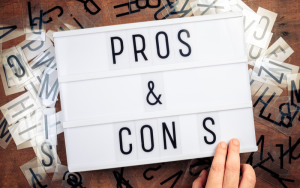![Robinhood Review & Rating [yyyy]](https://atozmarkets.com/wp-content/uploads/golammoktadir/2022/04/Robinhood-feature-image-160x107.png)
Robinhood Review & Rating 2024
VisitRobinhood is a US-based no commission trading platform that has taken the industry by storm since 2013, with millions of users flocking to it. In addition to the trading service, Robinhood also introduced Cash Management to help Robinhood customers earn interest on uninvested funds.
There has been a lot of hype and demand on the US platform, and we, therefore, need to learn a lot more about it in this Robinhood broker review.

image source: Robinhood
In this Robinhood review, we take a much closer look at how the platform works and how to use it. To help you make the right financial decisions, we must also assess whether it is the right platform to trade cryptocurrencies.
The main purpose of the review or Robinhood is to help you get the full insight and overview of the platform so that you can ultimately assess whether it is the right platform for you.
Robinhood Review: Company
Robinhood is one of the best online brokers launched in 2013 by two visionary innovators, passionate about technology and trading, namely Baiju Bhatt and Vladimir Tenev. Over the years the broker has been managed by Robinhood Markets Inc.
Born from revolutionary ideas in the online trading sector, Robinhood has always set itself the goal of wanting to offer trading methods, focusing on convenience and ease of use.
It is not surprising how the chosen denomination, which can somehow be associated with the fairy-tale character who stole from the rich to feed the poor, somehow represents a rather unique and innovative strategy.
Robinhood has thus tried to bring to its side that niche of users willing to start their own path in online trading, without necessarily having to use banking channels or expensive platforms.
The same principle has allowed the platform to obtain millions of registered users in just over 7 years.
The official headquarters are in the United States, specifically in California. The same territory represents the primary source of the same platform, which appears to be available purely for the US market.
Despite this, given the successes achieved over the last few years, Robinhood intends to broaden its territorial diversification strategy, also focusing on the European market.
Pros and Cons Of Robinhood

Pro
- Trading without commissions
- Trading on margin
- Over 5,000 instruments to trade
- Purchase of fractional shares
- Interest on uninvested capital
Cons
- Limited trading tools
- No mutual funds
- No retirement accounts
- Available for US residents only
Is Robinhood Trusted?

Is Robinhood a safe platform? Of course, it is very relevant to look at the security of Robinhood, especially when it is a platform to manage your money. This is of great importance, as the security standards for a platform like Robinhood should be very high.
Regarding Robinhood, it can generally be said that the platform provides technical security that lives up to the general standards.
Users can log in to the app with a face or fingerprint, or a custom PIN. At the same time, Robinhood encourages its users to enable 2FA, but this is not a requirement.
They have also set up some security measures making it harder for hackers to break into an account.
New logins from unknown devices must also be verified with a six-digit code that is sent via SMS or e-mail if two-factor authentication is not activated.
Robinhood is also a member of the SIPC, which protects members' securities up to $500,000 (including $250,000 for cash claims).
In addition, the platform has done much to ensure that users' personal CPR numbers are encrypted so that no one has access to them.
It is thus clear that Robinhood is safe as it has done a lot to make the platform as secure as possible for its users.
Robinhood Review: Trading Platform

Robinhood has mobile and web trading platforms that are extremely easy to set up and use. Thanks to a mobile app with a clean design that focuses on the basics, Robinhood is an easy choice for new investors who primarily use devices to manage their accounts.
You can also use the web-based trading platform which looks similar to the app. Both trading platforms support the same order types and asset classes.
Once logged into the mobile app, you will see a line graph showing your portfolio value and purchasing power. You'll find the main menu at the bottom of the screen, where you can easily use the search function to view a stock's graph across multiple time frames.
In the mobile app, you'll see information about stock trading, including its highs and lows, market capitalization, and P/E ratio.
Robinhood also provides a news feed, a set of analyst rankings, and a company profile. When you're ready to make a buy or sell decision, the trade button scrolls down the page, allowing you to place an order at any time.
Overall, the user experience is pleasant and the Robinhood app works flawlessly. One caveat is that there is very little you can do to customize or personalize the app based on your desired trading experience.
The Robinhood review team found that the mobile app and website have some interruptions during the market peaks of late February and early March 2020. However, these problems have been overcome.
Robinhood Review: Account Types
Robinhood offers three types of investing accounts, each designed to suit your investing goals and needs:
Robinhood Instant
If you sign up after reading this Robinhood review, you automatically open a Robinhood Instant account.
You will have access to instant deposits and extended-hours trading. You also won’t have to wait 3 days for your funds to process when you sell stocks or make a deposit (up to $1,000).You can transfer up to $50,000 per business day into your account.
Robinhood Instant is free. There are no monthly or recurring fees, no trading commissions, no interest charges, and no account minimums.
Robinhood Gold
Robinhood Gold is a premium trading account, with access to higher-level research, more trades allowed daily, and margin accounts for a small monthly fee of $5.
This Robinhood Gold account only permits three daily trades in a five trading day period. However, they allow unlimited trades if you have $25,000 of equity. Robinhood will also permit several trades if you have a gold or margin account.
A Robinhood Gold account is like a Robinhood Instant account but gives you access to more buying power and more advanced and up-to-date research reports.
Upgrading to this Robinhood gold account type comes with some benefits:
- Advanced research reports and market data. Access approximately 1,700 in-depth equity research reports produced by Morningstar, an independent investment research firm.
- Larger instant deposits. Get instant access to $5K- $50K when you make a deposit, depending on your account balance and status.
- Borrow money at an interest rate of 2.5%
Robinhood Cash
Robinhood Cash account allows you to place commission-free trades during the standard and extended-hours trading sessions. However, unlike the Instant account, you won’t have access to instant deposits or instant settlements.
You can downgrade to a Cash account from an Instant or Robinhood Gold account at any time. If you downgrade, you will immediately lose access to the premium features and be charged any interest accumulated during the billing cycle.
Does Robinhood Offer Retirement Accounts?
No, they do not. However, back in July 2021, Vlad Tenev said Robinhood Markets is considering launching retirement accounts,based on demand it’s seen from current customers.
Offering individual retirement accounts, or IRAs, and Roth IRAs, which offer tax advantages to those saving for retirement, would allow Robinhood to tap a vast market.
Account Minimum Deposit
Without there being an account minimum that you have to deposit, Robinhood is super friendly to new investors, but the financing process itself is even better. If you've ever tried to deposit to an exchange before, you know it can take a while to get the money into the account, but here Robinhood stands out.
With Robinhood, you get the money into your account immediately. By making use of the instant verification with the major banks, Robinhood allows you to avoid the hassle of traditional verification of reporting small deposits to your bank account. This means the app can move up to $1,000 of any deposit to the account right away, with the remainder following a few days later. It gets you started faster on the platform and with investing your money.
How to open a Robinhood account
To get started, the trader downloads the app on your mobile device or visits the Robinhood website with their computer. Using either one, go through the following 4 steps:
- Find the "Sign Up" button, after which you will be asked to enter some information such as your name and email address.
- In the next step, you will be asked to enter more details about yourself, such as your telephone number, home mailing address, and to answer a few questions, especially if a member of your family is a shareholder. Or senior manager of a public company.
- You will now be asked to provide your Social Security number and some other personal details. All this information is required under the USA Patriot Act 2001.
Read Also: Robinhood Vs eTrade Comparison
Once completed, the application will be received by Robinhood and reviewed. The check normally takes only 24 hours. But some users complained that they waited up to 7 days to create the account. Which seemed a long time to us. Once your account is approved, you can start trading from your smartphone or web browser.
Cryptocurrency
Interest in cryptocurrency trading is growing rapidly. Therefore, it may also be understandable that new providers in particular are trying to offer a business with digital assets. Does Robinhood offer cryptocurrency trading? Yes, they do.

If you already know which cryptocurrencies you want to trade, you can easily check if they are available. However, you should be aware that there is not the widest selection on Robinhood, so if you are planning to invest in many different cryptocurrencies in the future, then you may well become relatively limited with Robinhood.
At the time of writing, Robinhood offers Bitcoin, Ethereum, Dogecoin, Litecoin, Ethereum Classic, Bitcoin SV, Bitcoin Cash.
Cryptocurrency trading with Robinhood also has some advantages.
- 0% commissions against an average of 4% present on other brokers
- Trade crypto 24 hours a day, seven days a week
- Industry-leading security
- Ownership of your coins
- Cold storage for the vast majority of customer coins
- Insurance against theft and cyber security breaches
Unlike many online brokers, Robinhood users can buy certain cryptocurrencies right in their stock trading account. What's more, it's completely free. You can use any funds you've deposited into your brokerage account to purchase cryptocurrencies through Robinhood Crypto.
Fees and Commissions
Is Robinhood good in terms of stock trading fees?
As I have mentioned before, the whole basis of Robinhood's existence is low or no fees at all. It is something that is repeated everywhere on the platform, which is also reflected in the number of users who have chosen the platform because of just this. Robinhood is doing really well here!
Let's start by reviewing some basic terms related to fees on various exchanges. Here it is important to keep an eye on trading fees - and fees that are not related to trades.
The trading fees are relevant when you trade, and they can consist of, for example, commissions, spreads, and financing rates as well as conversion fees. Fees that are not related to trades can be withdrawal fees or inactivity fees.
Indeed, Robinhood is best for active investors looking for commission-free trading and mobile investing access.
Buying mutual funds and ETFs
Since Robinhood offers zero-commission stock trading, this also means that you can trade ETFs free of charge. However, Robinhood doesn't currently offer mutual funds trading at all, which is a big negative differentiator from many of its competitors.
While it may integrate mutual funds capabilities into its platform someday, for the time being, it's not possible to buy shares of your favorite mutual funds through Robinhood.
Customer Support

When you want to get in touch with Robinhood customer support, it has to be done via their app or website. Unlike other brokers, there is no phone number available, so you can not call Robinhood for help.
Robinhood is also said to have discontinued telephone support due to a large number of calls it allegedly could not handle.
The broker appears to be more active on social media such as Twitter (@AskRobinhood), Instagram and Facebook where users can make inquiries.
All in all, their customer support is really nice if you have one of the many questions that can be easily answered by one of their many support articles, or which are available via the chatbot.
But it should not differ much before you need their customer support. It must be said that it is a bit mediocre, but also nice that after all there is an opportunity to get in touch for customer support.
Regulation of Robinhood

Is Robinhood scam or legit? Robinhood is regulated by the U.S. Securities and Exchange Commission (SEC) and maintains membership in the Financial Industry Regulatory Authority (FINRA).
In 2020, Robinhood was hit with a $65 million fine by the Securities and Exchange Commission for misleading customers. In addition, Robinhood was hit with a $70 million penalty in June 2021 related to misleading customers, approving risky trades for some traders, and a series of service outages during a period of market volatility.
US regulators are also known to be hard on companies that act unfairly. You can therefore be sure that all protective measures are in place to prevent a Robinhood scam
Remember that the authorization from these regulatory bodies do not guarantee the safety of investments, but they guarantee that money will not be stolen in the middle of the operations.
Conclusion
Robinhood is one of the best online brokers as it represents an excellent opportunity for anyone who wants to enter the world of financial investments.
In this review we have seen who this broker is mainly aimed at, that is to a young and enterprising audience that does not need many frills, but on the contrary, wants to start investing immediately.
We then saw what the great advantages of Robinhood are like $0 account minimum, and how usability represents one of the greatest strengths of the platform.
Robinhood is great for fractional shares, whether you want to buy or reinvest your dividends.
The cost aspect is certainly the most important aspect of this broker. Robinhood offers commission-free trading to customers, including investments in cryptocurrency trades.
Customer support can be reached via chat or by leaving the phone number to be called back in a few minutes.
On the downside, Robinhood lacks of investing research and trading tools. We mentioned that Robinhood doesn't offer mutual funds. The lack of mutual funds may make it difficult to build a truly diversified portfolio.
To conclude this review of Robinhood, we would like to clarify that the world of financial investments is very risky. Investing in stocks, options or cryptocurrencies means facing very volatile markets that are able to make you a lot of money in a very short time, but at the same time drain all your capital.
Before starting to invest we warmly invite you to carefully study the basics of this world. Only when you feel ready and confident in your skills will you be able to invest real money and set realistic goals in terms of profits. Good luck!





















